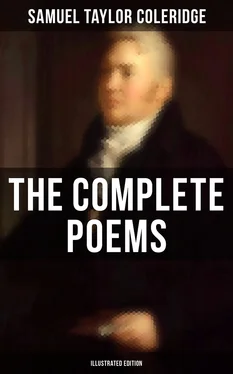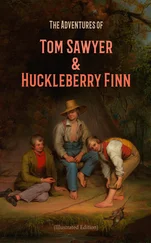But what can I say, when I have declared my abhorrence of the Edinburgh Review ? In vain should I tell my critics that were I placed on the rack I could not remember ten lines of my own poems, and that on seeing my own name in their abuse, I regard it only as a symbol of Wordsworth and Southey, and that I am well aware that from utter disregard and oblivion of anything and all things which they can know of me by experience, my name is mentioned only because they have heard that I was Wordsworth's and Southey's friend.
HINTS FOR "THE FRIEND"
The brightest luminaries of earth give names to the dusky spots in the selenography of Helvetius.
The intrepidity of a pure conscience and a simple principle [may be] compared to a life-boat, and somewhat in the detail, stemming with a little rudder the tumbling ruins of the sea, rebounding from the rocks and shelves in fury.
Duns Scotus affirms that the certainty of faith is the greatest certainty—a dark speech which is explained and proved by the dependence of the theoretic powers on the practical. But Aristotle admits that demonstrated truths are inferior in kind of certainty to the indemonstrable out of which the former are deduced.
Faithful, confident reliance on man and on God is the last and hardest virtue! And wherefore? Because we must first have earned a FAITH in ourselves. Let the conscience pronounce: "Trust in thyself!" Let the whole heart be able to say, "I trust in myself," and those whomever we love we shall rely on, in proportion to that love.
A testy patriot might be pardoned for saying with Falstaff, when Dame Quickly told him "She came from the two parties, forsooth," "The Devil take one party and his Dam the other." John Bull has suffered more for their sake, more than even the supererogatory cullibility of his disposition is able to bear.
Lavater fixed on the simplest physiognomy in his whole congregation, and pitched his sermon to his comprehension. Narcissus either looks at or thinks of his looking glass, for the same wise purpose I presume.
Reviewers resemble often the English jury and the Italian conclave, they are incapable of eating till they have condemned or craned.
The Pope [may be compared to] an old lark, who, though he leaves off soaring and singing in the height, yet has his spurs grow longer and sharper the older he grows.
Let us not, because the foliage waves in necessary obedience to every breeze, fancy that the tree shakes also. Though the slender branch bend, one moment to the East and another to the West, its motion is circumscribed by its connection with the unyielding trunk.
A HINT FOR "CHRISTABEL"
My first cries mingled with my mother's death-groan, and she beheld the vision of glory, ere I the earthly sun. When I first looked up to Heaven consciously, it was to look up after, or for, my mother.
"ALL THOUGHTS ALL PASSIONS ALL DELIGHTS"
The two sweet silences—first in the purpling dawn of love-troth, when the heart of each ripens in the other's looks within the unburst calyx, and fear becomes so sweet that it seems but a fear of losing hope in certainty; the second, when the sun is setting in the calm eve of confident love, and [the lovers] in mute recollection enjoy each other. "I fear to speak, I fear to hear you speak, so deeply do I now enjoy your presence, so totally possess you in myself, myself in you. The very sound would break the union and separate you-me into you and me. We both, and this sweet room, its books, its furniture, and the shadows on the wall slumbering with the low, quiet fire are all our thought, one harmonious imagery of forms distinct on the still substance of one deep feeling, love and joy—a lake, or, if a stream, yet flowing so softly, so unwrinkled, that its flow is life, not change—that state in which all the individuous nature, the distinction without division of a vivid thought, is united with the sense and substance of intensest reality."
And what if joy pass quick away? Long is the track of Hope before—long, too, the track of recollection after, as in the Polar spring the sun [is seen in the heavens] sixteen days before it really rises, and in the Polar autumn ten days after it has set; so Nature, with Hope and Recollection, pieces out our short summer.
WORDS AND THINGS
N.B.—In my intended essay in defence of punning (Apology for Paronomasy, alias Punning), to defend those turns of words—
Che l'onda chiara,
El'ombra non men cara—
in certain styles of writing, by proving that language itself is formed upon associations of this kind—that possibly the sensus genericus of whole classes of words may be thus deciphered (as has indeed been attempted by Mr. White, of Clare Hall), that words are not mere symbols of things and thoughts, but themselves things, and that any harmony in the things symbolised will perforce be presented to us more easily, as well as with additional beauty, by a correspondent harmony of the symbols with each other. Thus, heri vidi fragilem frangi, hodie mortalem mori ; Gestern seh ich was gebrechliches brechen, heute was sterbliches sterben, compared with the English. This the beauty of homogeneous languages. So Veni, vidi, vici .
[This note follows an essay on Giambattista Strozzi's Madrigals, together with a transcription of twenty-seven specimens. The substance of the essay is embodied in the text of Chapter xvi. of the "Biographia Literaria," and a long footnote. The quotation is from the first madrigal, quoted in the note, which is not included in those transcribed in Notebook 17.— Coleridge's Works , iii. (Harper & Brothers, 1853), pp. 388-393.]
ASSOCIATION
Important suggestion on 4th March, 1810 (Monday night). The law of association clearly begins in common causality. How continued but by a causative power in the soul? What a proof of causation and power from the very law of mind, and cluster of facts adduced by Hume to overthrow it!
COROLLARY
It is proud ignorance that, as a disease of the mind, alone superinduces the necessity of the medium of metaphysical philosophy. The errors into which a sound, unaffected mind is led by the nature of things (Thing as the substratum of power)—no errors at all, any more than the motion of the sun. "So it appears "—and that is most true—but when pride will work up these phenomena into a system of things in themselves , then they become most pernicious errors, and it is the duty of true mind to examine these with all the virtues of the intellect—patience, humility, etc.
MOTHER WIT
"By aid of a large portion of mother's wit, Paine, though an unlearned man, saw the absurdity of the Christian religion." Mother's wit, indeed! Wit from his mother the earth—the earthy and material wit of the flesh and its lusts. One ounce of mother-wit may be worth a pound of learning, but a grain of the Father's wisdom is worth a ton of mother-wit—yea! of both together.
OF EDUCATION
"O it is but an infant! 'tis but a child! he will be better as he grows older." "O! she'll grow ashamed of it. This is but waywardness." Grant all this—that they will out grow these particular actions, yet with what HABITS of feeling will they arrive at youth and manhood? Especially with regard to obedience, how is it possible that they should struggle against the boiling passions of youth by means of obedience to their own conscience who are to meet the dawn of conscience with the broad meridian of disobedience and habits of self-willedness? Besides, when are the rebukes, the chastisements to commence? Why! about nine or ten, perhaps, when, for the father at least, [the child] is less a plaything—when, therefore, anger is not healed up in its mind, either by its own infant versatility and forgetfulness, or by after caresses—when everything is remembered individually, and sense of injustice felt. For the boy very well remembers the different treatment when he was a child; but what has been so long permitted becomes a right to him. Far better, in such a case, to have them sent off to others—a strict schoolmaster—than to breed that contradiction of feeling toward the same person which subverts the very principle of our impulses. Whereas, in a tender, yet obedience-exacting and improvement-enforcing education, though very gradually, and by small doses at a time, yet always going on—yea! even from a twelvemonth old—at six or seven the child really has outgrown all things that annoy, just at the time when, as the charm of infancy begins to diminish, they would begin really to annoy.
Читать дальше












